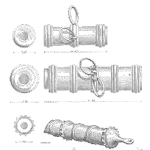
Reliability Centered Maintenance principles will be celebrating their golden anniversary soon. And you may be surprised where the process finds its roots!
[Read more…]Your Reliability Engineering Professional Development Site
Find all articles across all article series listed in reverse chronological order.
by Nancy Regan Leave a Comment

Reliability Centered Maintenance principles will be celebrating their golden anniversary soon. And you may be surprised where the process finds its roots!
[Read more…]by Hemant Urdhwareshe Leave a Comment

I am happy to share my next video on ‘Life Data Analysis of Right Censored Data using Minitab Software’ as many viewers had requested! In this video, we revisit the types of failure data and explain procedure to analyse right censored data in Minitab software with an example.
The procedure is predominantly in three steps:
The procedure is explained in detail using an application example of camshaft failure data. In the video, I have also explained how to estimate expected number of failures by 100000 Kilometres and also the 95% upper bound which is the worst-case scenario. I am sure, you will find this video interesting and useful for practical application of Life Data Analysis! Your feedback on the video is welcome!
[Read more…]by Larry George Leave a Comment

Fred asked me to explain why use nonparametric statistics? The answer is reality. Reality trumps opinion, mathematical convenience, and tradition. Reality is more interesting, but quantifying reality takes work, especially if you track lifetimes. Using field reliability reality provides credibility and could reduce uncertainty due to tradition and unwarranted, unverified assumptions.
Data is inherently nonparametric. Cardinal numbers are used for period counts: cohorts, cases, failures, etc. Accounting data is numerical; it is derived from data or from dollars required by GAAP (Generally Accepted Accounting Principles); e.g., revenue = price*(products sold), service cost = (Cost per service)*(Number of services), or numbers of spare parts sold. Why not do nonparametric reliability estimation, with or without lifetime data?
[Read more…]Young professionals (under 40) will make up over half of the workforce by the end of next year. That means communication between young professionals and experienced professionals is essential for workplace success. Younger professionals dominating the workforce means that reliability engineering is undergoing formative changes. These are a few general thoughts on the impacts of the changing workforce and five ways it will impact reliability engineering.
Here are a few thoughts on intergenerational communication from my recent interview on The YoPro Know Podcast.
Companies are generally awkward with social media and how to reach the younger generations. On the one hand, companies know to try. On the other hand, the HR people and some of the technical managers are really bad at it.
Companies should do a gap analysis on reaching young professionals. There are inadvertent things companies do that really cause them to stumble inadvertently. Most companies do too much of a cookie-cutter approach to recruiting and retention.
[Read more…]by Robert (Bob) J. Latino Leave a Comment

In this episode we will discuss the two main types of failures and how to go about developing a bad actor equipment list.
by Christopher Jackson Leave a Comment

Boeing has somehow managed to make the bad public relations created by those pesky onboard batteries catching fire in 2013 practically disappear. Not through good management. But through a never-ending series of disasters and catastrophes that shows no sign of letting up which is dominating Boeing’s news cycle that there is no remaining airtime for missteps like those battery fires.
by Fred Schenkelberg 1 Comment

During RAMS this year, Wayne Nelson made the point that language matters. One specific example was the substitution of ‘convincing’ for ‘statistically significant’ in an effort to clearly convey the ability of a test result to sway the reader. For example ‘the test data clearly demonstrates…’
As reliability professionals let’s say what we mean in a clear and unambiguous manner.
Thus, you may suspect, this topic is related to MTBF.
[Read more…]by Nancy Regan Leave a Comment

There is a big difference between Preventive Maintenance Optimization (PMO) and Reliability Centered Maintenance (RCM). Daffodils are a perfect way to explain the difference.
[Read more…]by Greg Hutchins Leave a Comment

This article is the twelfth of fourteen parts to our risk management series. The series will be taking a look at the risk management guidelines under the ISO 31000 Standard to help you better understand them and how they relate to your own risk management activities. In doing so, we’ll be walking through the core aspects of the Standard and giving you practical guidance on how to implement it.
In previous articles we’ve looked at the core elements of the risk management framework and the role of leadership and commitment, integration, design, implementation, evaluation and improvement more specifically. We’ve also briefly looked at the risk management process in a general sense, the importance of communication and consultation, how to set your scope, context and criteria, as well as the identification, analysis and evaluation of risks. In this article, we’ll be looking at treating risk. [Read more…]
by Mike Sondalini Leave a Comment

Maintenance Work Backlog Management: a Start in Managing Maintenance! A maintenance manager can commence a maintenance improvement programme by simply creating opportunities for individuals and groups to make high performance contributions. One way to do this is to manage the Maintenance Backlog.
[Read more…]by Hemant Urdhwareshe 2 Comments

One of the weak areas in designing parts is deciding tolerances of various parts. Most engineers are familiar with Arithmetic Tolerance stack up analysis wherein they check impact of maximum and minimum values of various tolerances on assembly of parts. However, this can often result in high manufacturing cost. Thus, it may be more appropriate to analyse tolerances using statistical tolerance stack up approach. This can be performed using Monte Carlo Simulation. In one of the previous videos, I had shown how to predict reliability using Monte Carlo simulation. In this video, I will explain how to perform statistical tolerance stack up analysis using Monte Carlo Simulation. I have used Simular software to demonstrate this with a practical example. Simular is a free software (emailware) which can be downloaded from https://www.simularsoft.com.ar/. However, one can use other software such as Crystal Ball, @Risk etc. for such analysis. Statistical tolerance stack up is usually an integral part of Design for Six Sigma (DFSS) projects. I hope viewers will find this video useful. Feedback is welcome!
[Read more…]by André-Michel Ferrari 2 Comments

In line with the RAM acronym sequence, we often start and go no further than the “R” in Reliability. In doing so, we forget about the “M”. The question often asked is: “what is the reliability of the system?” But rarely asked is: “what is the maintainability of the same system?” Myself, am guilty of this omission. Hence this article to remind myself and you the reader, of the importance of Maintainability in industry.
[Read more…]by Christopher Jackson Leave a Comment

Apple recently did something that it isn’t in the habit of doing. And that is – admitting failure. After spending $ 10 billion on ‘Project Titan’ whose aim was to produce a ‘really cool car,’ Apple decided to pull the pin and cancel it.
Simplifying Apple’s Project Titan ambitions to something as pithy as creating a ‘really cool car’ might seem a little condescending. The problem for Apple was that unfortunately, this was the practical truth. And that is why it failed.

If I must date myself, I cut my teeth as a product development engineer in the automotive industry in the bad old days when warranty terms were shockingly poor. Let’s examine this through the lens of my first new car which I purchased in 1984. Why was my warranty coverage so bad, what drove the significant improvements seen in the industry since that time, and how do we now validate our products to keep it that way?